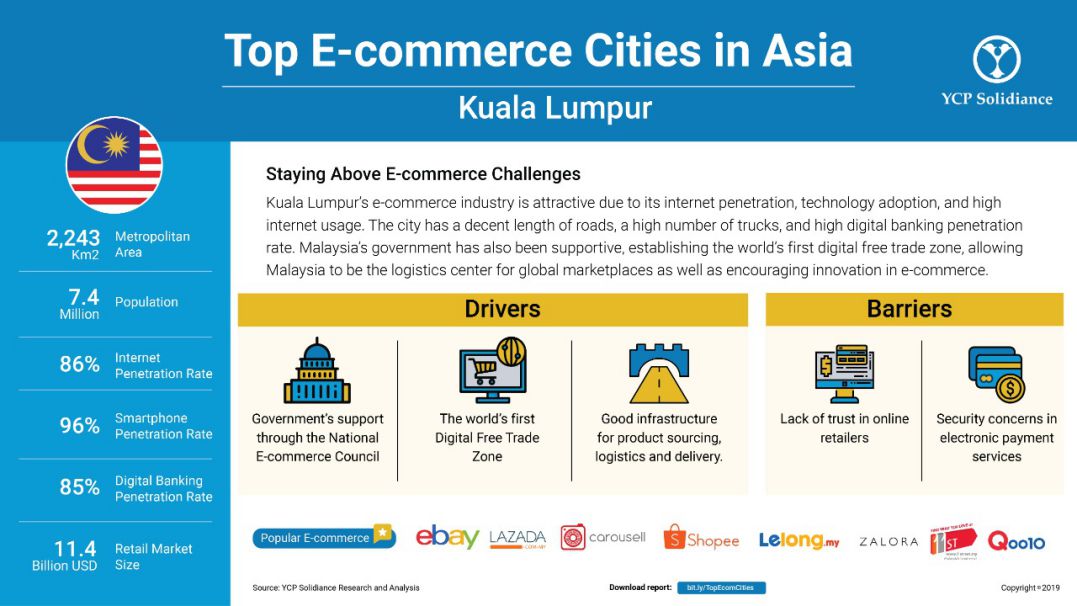Kuala Lumpur is one of Asia's top e-commerce cities, along with other cities, such as Jakarta, Bangkok, Beijing, and many more, according to our latest report, Top E-commerce Cities in Asia. The significance of e-commerce landscape in Asia as well as how it has grown and quickly adapted to global trend are featured in the report. The term “e-commerce city” in the report is referred as an urban city with interconnected infrastructure which make up an e-commerce ecosystem that helps it thrive.
With its dynamic economy and developed infrastructures for digital technologies, Kuala Lumpur is an attractive market for e-commerce in Asia. The city's e-commerce is mainly driven by its infrastructure readiness and government initiative as world's first digital free trade zone, to position Kuala Lumpur as a regional hub for e-commerce logistic and gateway. As a renowned destination for expats to live in, the city is even transforming into a melting pot for the world. Going into e-commerce, Kuala Lumpur is ready for the e-commerce industry, considering its network infrastructure and government support for the industry.
Kuala Lumpur is an attractive market due to its internet penetration, technology adoption and internet usage. A home to 7.4 million population has 86% internet penetration rate and 96% smartphone penetration rate, as well as 85% digital banking penetration and 11.4 billion retail market size. The largest sectors within e-commerce are travel, followed by entertainment media, consumer electronics and fashion. High penetration and good transport infrastructure for product sourcing, logistics and delivery are among the key drivers of the city's expected growth in e-commerce. That said, the overall growth of the city's e-commerce is seen to be positive, and players wanting to capture the its attractiveness can impose a challenge for the growth of the e-commerce industry.
In spite of being a key gateway in the region, lacks of trust in online retailers, particularly on product reliability and safety of payment mechanisms, can pose a challenge for the growth of Kuala Lumpur's e-commerce industry. Malaysia is also still struggling to cut the high logistic cost and a fairly low credit card penetration rate with USD 3.03 charged for every kilogram of goods delivered.
The report recorded an exponential growth of the world's e-commerce industry with a staggering USD 2.86 trillion E-tail revenues worldwide in 2018, expected to grow to USD 6 trillion in 2022. The market in Asia Pacific had a 35% economic growth rate in 2018 and retail e-commerce sales reaching USD 1.8 trillion, positioning the region as a clear leader in achieving one-fourth of global e-commerce share by 2023.
Furthermore, the recommended framework in the report, providing 5 key building blocks for startup ecosystem in reaching its full potential, can help Kuala Lumpur and other global cities to improve their e-commerce ecosystem, inclusive of stable and predictable regulatory environments; adequate talent; market readiness and robust infrastructure; funding to scale up the business, and global culture to empower innovative ideas.
Download the full report on Top E-commerce Cities in Asia.

